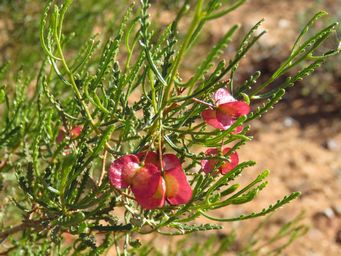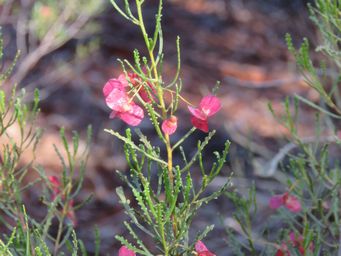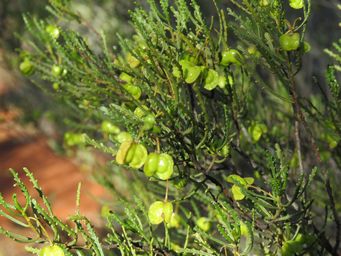Australia So Much to See
Copyright (C) 2013 AustraliaSoMuchtoSee.com. All reights reserved

Sources used for identification of wildflowers shown on these pages and regions where they occur see Credits
These pages will
feature some of the wildflowers we have photographed in Western Australia, and where possible, identified. If you
are able to help identify further flowers, or correct any I may have wrong, please contact us.
Information given for each species
will give botanical name, known common names, describe the flower, give time of year it flowered, and where it was photographed, and
the areas it occurs in. Names have been matched to Florabase which has also been used to show distribution.
See some
of these wildflower in larger sized photos on our Flickr pages.
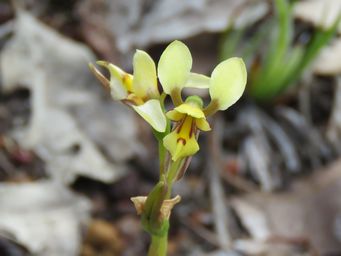
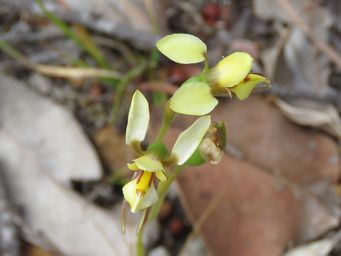
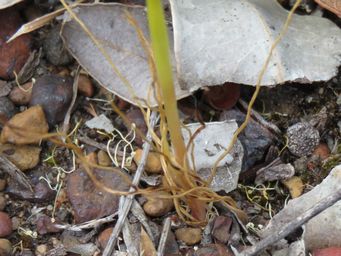
Diuris setacea, Bristly Donkey Orchid (above and at right with foliage below)
Small pale yellow flowers with some brown markings.
Several flowers on single stem. These flower later in the season than other Diuris species. Foliage consists of a lot
of very narrow and curly leaves from the base of the plant. Photo at right shows these but they are drying off.
November
Bridgetown,
South West Region, Western Australia and found from north of Geraldton to east of Esperance, and in all areas to the west of a line
between the two, covering the Mid West, Wheatbelt, Perth, South West and Great Southern regions, and the coastal part of the Goldfields.
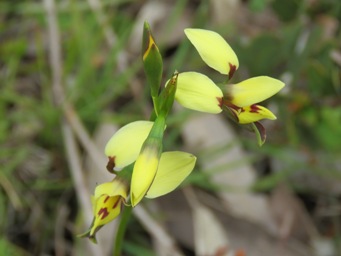
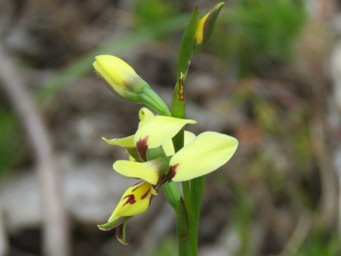
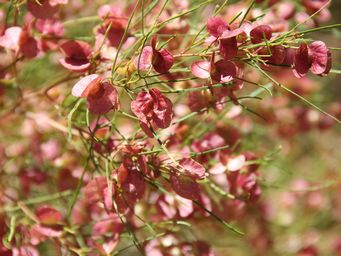
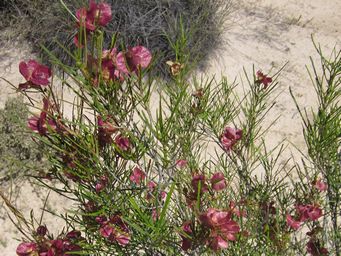
Dodonaea viscosa subsp. angustissima 1985 (formerly Dodonaea attenuata, Narrowleaf Hopbush) Sticky Hopbush, Native Hops
Inconspicuous
tiny flowers in Spring and Summer, with the winged red seed pods forming
The two photos above showing pink pods and dried pods
were taken at Jilakin Rock near Kulin in November. Specimen below left was photographed at Mollerin Lake and below
right at Elachbutting Rock in the Wheatbelt in November.
Dodonaea viscosa occurs throughout Western Australia.
There are
four subspecies of Dodonaea viscosa, with subspecies angustissima being the only one with narrow foliage. This can be found
in most of the southern half of Western Australia, with very little in the Pilbara and none in the Kimberley.
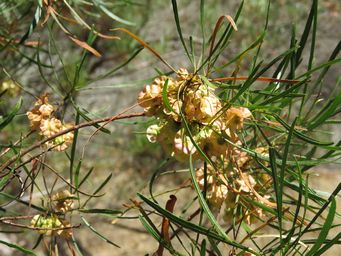
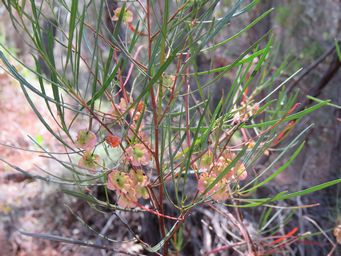
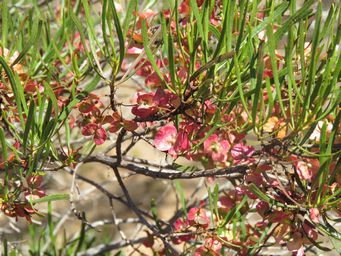
Dodonaea viscosa subsp. angustissima seen at Dragon Rocks Nature Reserve, Newdegate has broader leaves than the specimens shown above.
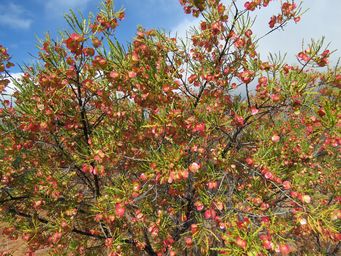
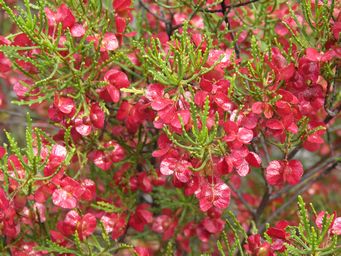
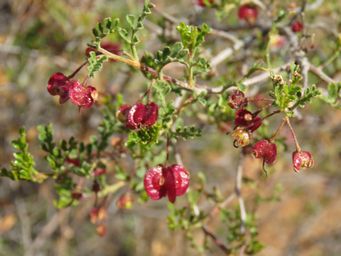
Dodonaea lobulata, Lobe leaf Hop Bush, Bead Hopbush, Lobed-leaved hop-bush, Lobed hop-bush.
Inconspicuous tiny flowers, with the
winged seed pods forming, going from green through shades of pink to dark red with maturity. Each shrub was at a different stage.
Shrubs grow up to three metres in height. Foliage alternates up the stems, with each having short protrusions paired along the
leaf, and at right angles to the leaf
Seed pod stage photographed in August
Menzies north of Kalgoorlie and at Newman Rocks near Balladonia,
in the Goldfields, and occurs throughout the Goldfields and extends into the inland Mid West and Wheatbelt Regions
Dodonaea, species uncertain, possibly Dodonaea adenophora or maybe Dodonaea, species uncertain, possibly Dodonaea adenophora or
maybe Dodonaea microzyga var. acrolobata, Brilliant Hopbush.
Inconspicuous tiny flowers, with the winged red seed pods
forming. Foliage alternates up the stems, with foliage consisting of leaflets paired along the stalk.
Seed pod stage
photographed in August
Newman Rocks, near Balladonia in the southern Goldfields.
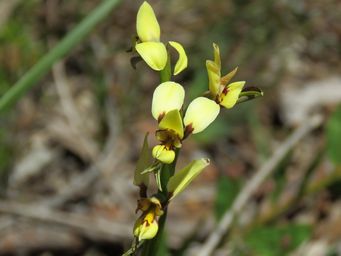
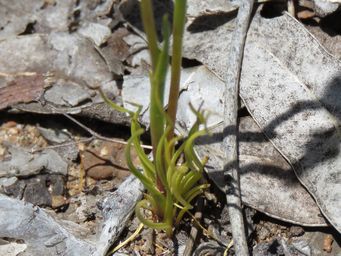
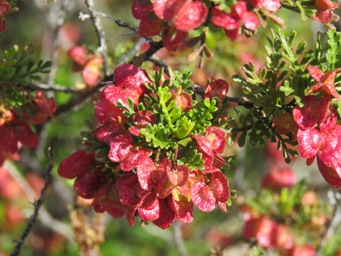
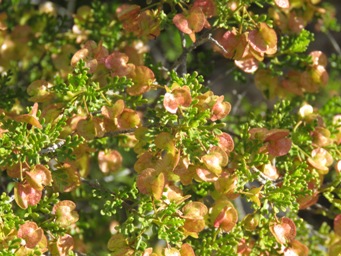
Dodonaea, species uncertain, and likely as named above.
Inconspicuous tiny flowers, with the winged red seed pods
forming. Foliage alternates up the stems, with foliage consisting of leaflets paired along the stalk with an odd number
having one leaflet at the tip.
Seed pod stage photographed in August
Boorabbin national park, which is between Southern Cross (Yilgarn
Shire) and Coolgardie (Shire of Coolgardie).
Dodonaea microzyga
Dodonaea inaequifolia
Dodonaea species are medium to tall shrubs, which have colourful winged seed pods, following small flowers which are not often noticed. Pods change colour as the age, usually from green through pales shades to reds as can be seen on the photos of Dodonaeae lobulata
below. Various Dodonaea species can be found throughout all regions of Western Australia as well as in other states. Identification
from pods stage only is not guaranteed to be accurate.
Aboriginal name for Dodonaea species is Waning
